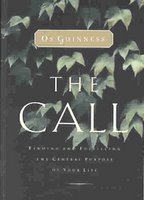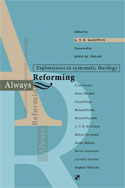 Here's a review of one of my favourite books. The review originally featured in an edition of Tron Times, the church news letter of St George's Tron, Glasgow. I think I wrote it in 2003. Everyone should read this book.
Here's a review of one of my favourite books. The review originally featured in an edition of Tron Times, the church news letter of St George's Tron, Glasgow. I think I wrote it in 2003. Everyone should read this book.I bought The Call about this time last year, and finished reading it while I was away from home working in England. My first instinct was to keep it in a place that was close to hand and so, on returning to Glasgow, it found a place in my special shelf.
Why is this book special? Well, at first sight it doesn’t seem so. The cover gives little away. Indeed, the title would normally arouse my contempt and suspicion: “Not another book on discovering God’s will…” There is no foreword or introduction. Only a note at the end of the contents page gives a clue about what Guinness has given us. The chapters – 26 in all – are intended to be individual meditations. Yet, together, they guide us through all the channels of working out what life is really about, and what God’s calling means.
Each chapter is not more than 12 pages. However, they are all packed with stories of significance. Each story illustrates an aspect of calling. This theme is further illustrated, discussed and thoroughly applied to the world, and our place in it. These illustrations are meaty in themselves. They are taken from the lives and writings of great men and women of the past. You will learn more about history in this book than you will in most history books.
What is God’s calling? Well, it is not the same as trying to determine God’s will for your life. However, it is related to that search. Here is what Guinness writes in the first of his meditations: “Calling is the truth that God calls us to himself so decisively that everything we are, everything we do, and everything we have is invested with a special devotion and dynamism lived out as a response to his summons and service.” To summarise this argument, everyone, everywhere, and in everything should think, speak, live, and act entirely for God. All of this is to be through Christ, and for Christ. We are not called to something (job, relationship, role), or somewhere (the inner city, or Outer Mongolia). We are called to Him. Everything else – our work, our relationships, our desires – must rest on this foundation.
Radical and orthodox. That is one way to describe the impact of this book. Protestant and Catholic distortions about calling and vocation are described and ditched as inadequate and harmful to spiritual growth and maturity. The ideologies and trends of modern life are put to the test, and found wanting. But the reader is forced to think about his or her own values. Do we live for ourselves, or have we heard and answered the call of Jesus of Nazareth? Are we prepared for the cost and the pain involved in that vocation?
Os Guinness will not write a more enduring work. If you like good, elegant writing you will revel in its pages. The style is not light, so be prepared to re-read sentences, or think through paragraphs. You will discover truth and insights that should change your life for good. Aimed primarily at Christians, any thoughtful man or woman will enjoy this book by one of the great, popular thinkers in the church today.





